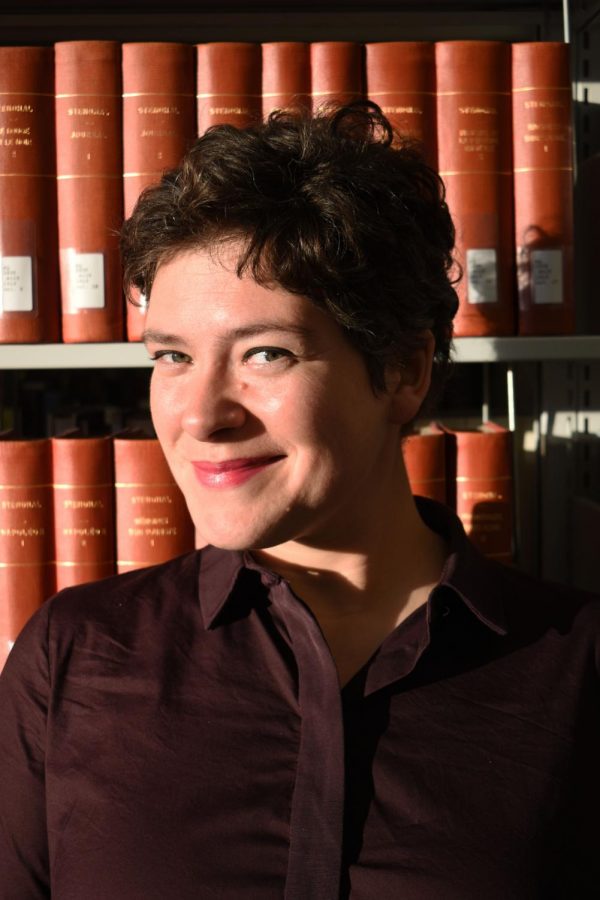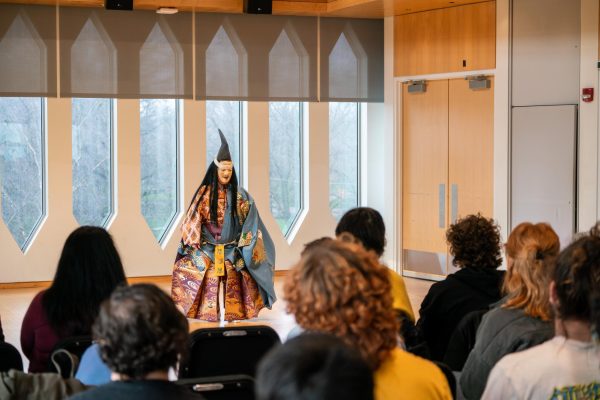German Department Celebrates 50-Year Anniversary
Visiting German Writer-in-Residence Nora Gomringer gave a public reading of her book Hydra’s Heads on Thursday, Nov. 7, in commemoration of the 50th anniversary of the Max Kade German Writer-in-Residence Program’s partnership with Oberlin College. The book, released in 2018, contains the first official English translation of her poetry. The publisher, Burning Eye Books, describes the book as “poems about the darker times of Germany’s modern history, reworkings of myths and fairytales and a three-page-long ode to sex against a wall.”
Since 1968, the Max Kade Writer-in-Residence program has sent German authors to Oberlin to share their writing experiences and literature with German-language students. The Max Kade Foundation, after which Oberlin’s German House is named, was created in 1944 to support cross-cultural exchange between Germany and America. In 2005, Professor Emeritus and Former Chair of German Language and Literature Heidi Thomann Tewarson wrote Willkommen und Abschied: Thirty-Five Years of German Writers-in-Residence at Oberlin College to celebrate the program’s history.
As Oberlin’s 48th German writer-in-residence, Gomringer brings to campus her life of work in spoken word poetry, short films, books, essays, plays, operas, magazine articles, and live readings. The European Literature Network describes Gomringer as “arguably the best known and loved German-language poet of her generation,” celebrated for poetry that is “clear-sighted” yet “surreal.”
At Oberlin, Gomringer teaches a seminar, in which she shares her literature and writing advice with students. Before taking the seminar, College fourth-year Milena Kagel described herself as “anti-poetry,” but seeing Gomringer’s work performed live in class has changed her opinion.
“It’s not words on a page,” Kagel said. “It has this beat, rhyme, and structure because of the effect of when it’s performed.”
Before coming to Oberlin, Gomringer was a member of the German division of the writer’s coalition PEN International, began studies for a Ph.D., and secured board seats for a German art museum and two universities.
As the child of a canonical German-Bolivian poet and a college professor, Gomringer explained that she grew up immersed in poetry.
“My mom got to know my father because she wrote her thesis at the end of her university education about his work,” she said. “I’m the child of a groupie, completely. It was always about literature, and so they made me their literature animal.”
Because of her upbringing, Gomringer always wanted to become a writer. Even so, she felt apprehensive about telling her parents that she would like to follow in their footsteps.
“I was deeply embarrassed to come out to my parents saying I would like to be a poet,” she said. “My father reacted in the nicest way possible, … he didn’t object. I realized a lack of objection made me the freest person I can be.”
Gomringer affectionately refers to her Oberlin seminar as a “curriculum-free.” She performs her poetry in class, answers questions about her work, and has even given students the chance to participate in a Skype call with her English translator Annie Rutherford. One of her regular homework assignments is “guerrilla-style poetry,” where students will leave a German poem stuck to its subject matter around campus.
According to Kagel, the seminar has been a valuable chance to personally engage with a talented German author.
“A lot of times, poetry needs to be demystified,” Kagel said. “I’d see something and … have no idea of how someone would [write] this … [or] what it means. She really shows us her process, explains why she chooses words and what things are supposed to evoke.”
College third-year Hannah Scholl adds that she is grateful to interact with Gomringer as she reads Gomringer’s work, especially because she often studies historically significant authors who are now deceased.
“I hadn’t been exposed to any modern German writing, especially poetry,” Scholl said. “[This seminar] makes German writing more accessible for people who might be intimidated by a class on authors like Goethe.”
Thanks to the seminar’s emphasis on modern German poetry, Scholl says that she has become inspired to write her own poetry in German. Although Gomringer’s poetry has had a profound impact on her seminar students, Gomringer herself hesitates to discuss her poetry as a learning tool.
“Since didactics took over in the 70s, every product of culture is evaluated for its nutritional value to students,” she said. “I wish a lot of poetry would be left alone from this idea of usefulness.”
Outside of this criticism, Gomringer acknowledges that poetry still performs an important function.
“One poem doesn’t change the world, but if the sensitivities and sensibilities that are kept alive that foster a climate where poetry can exist, be read, and be discussed, then I think it can be very beneficial to society,” Gomringer said.
Last night’s filled-to-the-brim reading was not just a celebration of Gomringer’s writing, but of the 50-year contributions to society and to the Oberlin community by the Max Kade Writer-in-Residence program. Gomringer and the writers to follow her are sure to leave lasting impacts on Oberlin.










